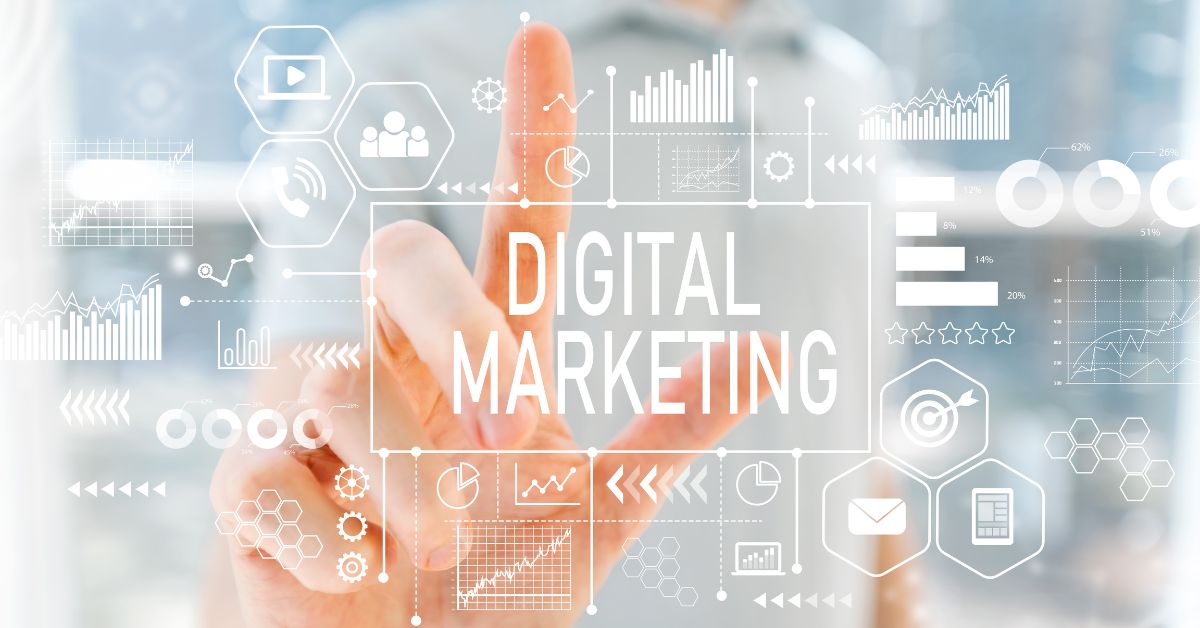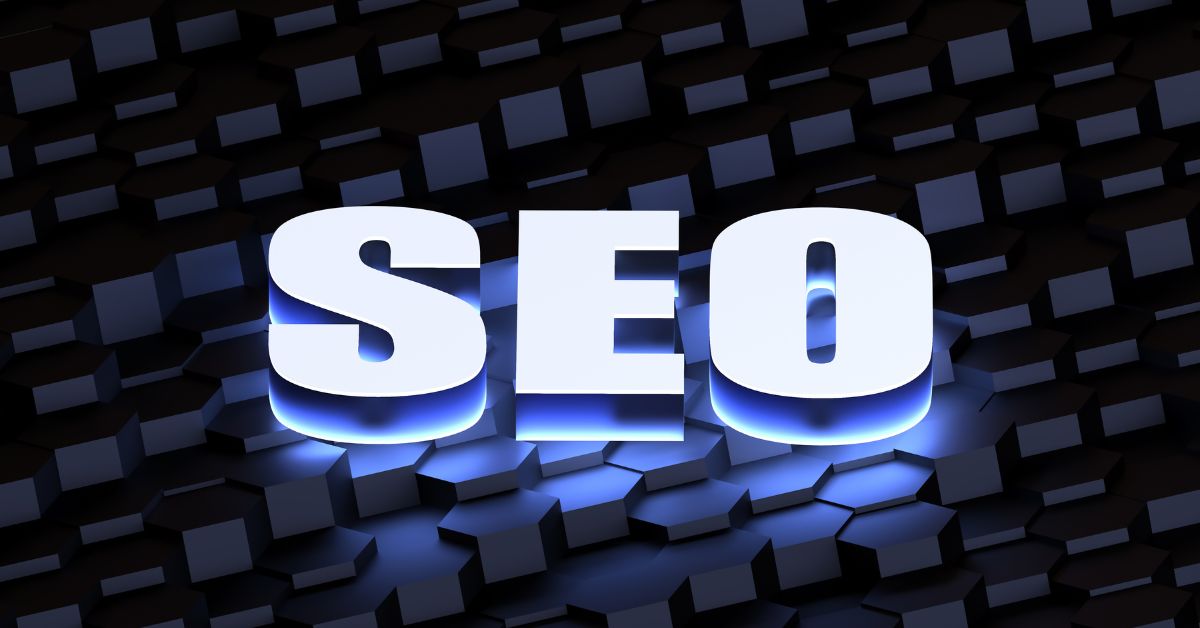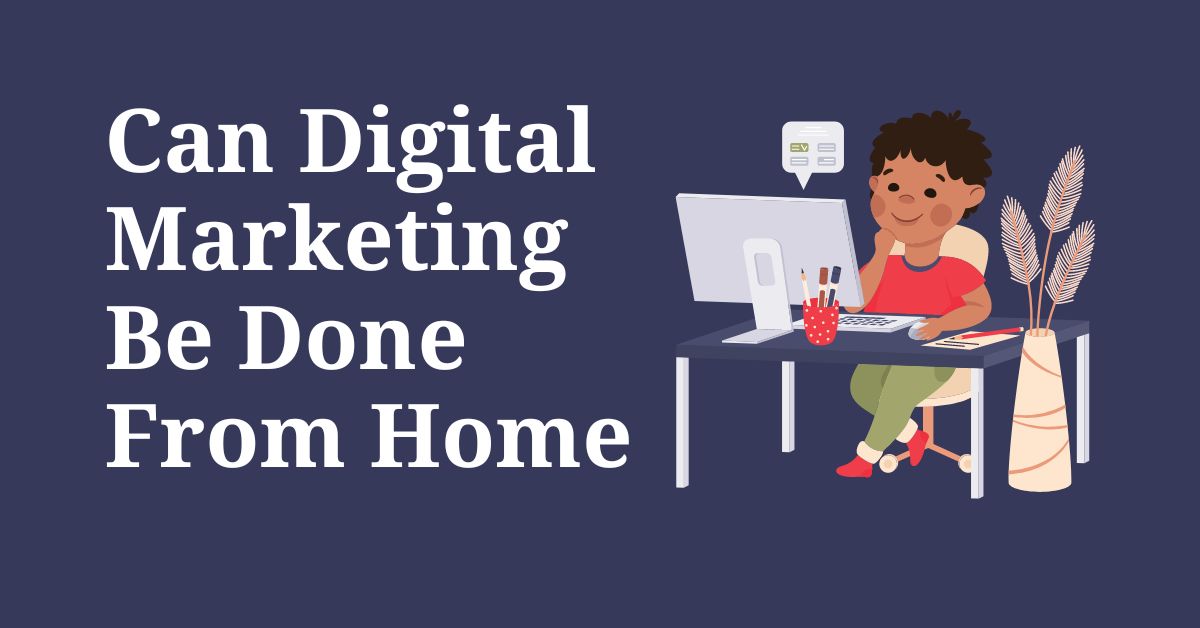Digital marketing can be done from home with the right tools and strategies, professionals can manage SEO, social media, email campaigns, and content creation remotely. This flexibility allows for global outreach, real-time analytics, and continuous learning, making it a viable option for businesses and freelancers alike.
Can Digital Marketing Be Done From Home?
Digital marketing has become an indispensable part of any business strategy in the 21st century. The rise of the internet has not only changed how businesses reach customers but has also transformed where and how work is done. With advancements in technology and a growing emphasis on work-life balance, the question arises: Can digital marketing be done from home? The simple answer is yes. However, the effectiveness, efficiency, and challenges of working from home in this field deserve a deeper exploration.
Can Digital Marketing Be Done From Home
Table of Contents:
- What is Digital Marketing?
- Evolution of Remote Work in Digital Marketing
- Tools and Technologies That Enable Digital Marketing from Home
- The Benefits of Digital Marketing from Home
- The Challenges of Remote Digital Marketing
- Strategies of Success in Remote Digital Marketing
- Case Studies: Success Stories of Remote Digital Marketers
- Future of Digital Marketing: Will Remote Work Become the Norm?
1. What is Digital Marketing?
The Digital marketing refers to the use of digital channels, platforms, and technologies to promote products, services, or brands to a targeted audience. Unlike traditional marketing methods, which might include print ads or billboards, digital marketing leverages online platforms such as websites, social media, email, search engines, and mobile apps to reach consumers.

This marketing strategy includes a broad range of tactics and technologies, including:
- Content Marketing: Creating and distributing valuable content to attract and engage a target audience.
- Social Media Marketing: Using social media platforms to promote products or services.
- Pay-Per-Click Advertising (PPC): A model of internet marketing in which advertisers pay a fee each time one of their ads is clicked.
- Email Marketing: Sending targeted emails to prospects and customers.
- Affiliate Marketing: Earning a commission by promoting other people’s products.
Digital marketing is a dynamic and versatile field, allowing for various approaches tailored to specific business goals.
2. Evolution of Remote Work in Digital Marketing
The digital age has brought about significant shifts in how businesses operate, with one of the most notable changes being the rise of remote work. Nowhere has this shift been more impactful than in the field of digital marketing. From the early days of telecommuting to the sophisticated, globally distributed teams of today, the evolution of remote work in digital marketing reflects broader changes in technology, culture, and business strategy.

Remote work, particularly in digital marketing, is not a new phenomenon, but its popularity has surged in recent years. The evolution of remote work in this industry can be attributed to several factors:
- Technological Advancements: The rise of cloud-based tools, communication platforms like Slack, and Zoom, and project management software like Trello and Asana have made remote collaboration seamless.
- Shift in Work Culture: There has been a significant cultural shift towards valuing work-life balance, with companies offering flexible work arrangements to attract top talent.
- Globalization: Digital marketing knows no geographical boundaries. Marketers can work from anywhere and still reach global audiences.
- The COVID-19 Pandemic: The pandemic accelerated the adoption of remote work, proving that many digital marketing tasks could be effectively performed from home.
The Early Days for Remote Work
Remote work in digital marketing began as a niche practice, often limited to freelancers or small agencies looking to reduce overhead costs. In the late 1990s and early 2000s, telecommuting was primarily an option for only a few roles, such as content writers or web developers, who could work independently. The infrastructure to support widespread remote work was still in its infancy, with dial-up internet, basic email communication, and rudimentary project management tools forming the backbone of early remote work arrangements.
The Growth of Digital Marketing and Remote Opportunities
As digital marketing grew in importance, so did the tools and technologies that made remote work more feasible. The rise of broadband internet, cloud computing, and advanced collaboration platforms like Slack and Asana in the mid-2000s allowed for more seamless communication and project management across remote teams. This period also saw the emergence of more specialized roles within digital marketing, such as SEO specialists, PPC managers, and social media strategists, many of whom could work effectively from anywhere.

The proliferation of these tools coincided with a broader cultural shift towards flexibility in the workplace. Companies began to see the benefits of remote work, not just in terms of cost savings, but also in attracting and retaining top talent. As a result, remote work became more mainstream within the digital marketing industry.
The Remote Work Boom Post-2020
The COVID-19 pandemic was a turning point for remote work across all industries, but especially in digital marketing. Suddenly, what had been a growing trend became the norm. Digital marketing agencies, in-house teams, and freelancers alike were forced to adapt to a fully remote environment almost overnight. This rapid transition was facilitated by the widespread adoption of video conferencing tools like Zoom, enhanced project management software, and cloud-based digital marketing tools that allowed for real-time collaboration and data sharing.
This period also saw the emergence of entirely remote digital marketing agencies, which capitalized on the ability to hire talent from anywhere in the world. The traditional office-based model was upended, with many companies choosing to remain fully remote even after the pandemic restrictions eased.
The Future Remote Work in Digital Marketing
Looking ahead, remote work in digital marketing is poised to continue evolving. The rise of artificial intelligence (AI) and machine learning is expected to further transform how remote teams operate, offering new tools for automating tasks, analyzing data, and optimizing campaigns in real-time. Additionally, as companies continue to prioritize work-life balance and flexibility, the demand for remote opportunities in digital marketing will likely remain strong.
However, this evolution will also bring challenges. Managing remote teams across different time zones, maintaining company culture, and ensuring effective communication are just a few of the hurdles that digital marketing leaders will need to navigate. Nevertheless, the benefits of remote work—greater access to talent, increased flexibility, and often higher productivity—are likely to outweigh these challenges.
The evolution of remote work in digital marketing is a testament to the industry’s adaptability and resilience. From its humble beginnings as a niche practice to becoming the dominant mode of operation during the pandemic, remote work has fundamentally reshaped how digital marketing is done. As technology continues to advance and workplace norms evolve, remote work is set to remain a central feature of the digital marketing landscape, driving innovation and growth in the industry.
This content provides a comprehensive look at how remote work has evolved in digital marketing, from its early days to the current trends and future outlook. It should resonate well with readers interested in the intersection of technology, work culture, and marketing.
3. Tools and Technologies That Enable Digital Marketing from Home
In today’s digital age, the ability to conduct marketing campaigns from the comfort of your home has never been more accessible. With a wide range of tools and technologies at your fingertips, digital marketers can manage and optimize campaigns, engage with audiences, and analyze results without stepping outside. Here’s a look at some of the key tools and technologies that empower digital marketing from home.
Successful digital marketing from home relies on a variety of tools and technologies designed to facilitate collaboration, communication, and productivity.
- Content Management Systems (CMS): Platforms like WordPress and HubSpot allow marketers to create, edit, and publish content without needing to write code.
- SEO Tools: Tools like Ahrefs, SEMrush, and Google Analytics help digital marketers analyze and optimize their website’s performance.
- Social Media Management Tools: Hootsuite, Buffer, and Sprout Social allow marketers to manage multiple social media accounts, schedule posts, and track performance from one dashboard.
- Email Marketing Tools: Mailchimp, Constant Contact, and ConvertKit enable the creation and automation of email campaigns.
- Collaboration Tools: Slack, Microsoft Teams, and Zoom facilitate communication and collaboration among remote teams.
- Project Management Tools: Help digital marketing teams manage projects, track progress, and meet deadlines.
Social Media Management Platforms
Tools like Hootsuite, Buffer, and Sprout Social allow marketers to schedule posts, monitor engagement, and analyze social media performance across multiple platforms. These tools also provide collaborative features, making it easier for teams to work together remotely.
Content Management Systems (CMS)
Content Management Systems like WordPress, Wix, and Squarespace enable marketers to build and maintain websites without needing advanced technical skills. With a CMS, you can update content, add new pages, and integrate SEO best practices from any location.
Search Engine Optimization (SEO) Tools
SEO remains a critical component of digital marketing, and there are numerous tools available to optimize your website for search engines. Ahrefs, SEMrush, and Moz offer comprehensive features for keyword research, backlink analysis, and competitor insights. These tools help marketers enhance their site’s visibility and rank higher on search engine results pages (SERPs) from anywhere.
Email Marketing Platforms
Email marketing continues to be a powerful way to connect with customers. Platforms like Mailchimp, ConvertKit, and ActiveCampaign enable marketers to design emails, automate campaigns, and track engagement metrics. With these tools, you can manage your email marketing efforts from home, ensuring that your messages reach the right audience at the right time.
Analytics and Reporting Tools
Google Analytics, Adobe Analytics, and Hotjar provide deep insights into website traffic, user behavior, and conversion rates. These tools allow marketers to measure the effectiveness of their campaigns and make data-driven decisions, all from a remote setting.
Video Conferencing and Collaboration Tools
Communication is key when working remotely, and tools like Zoom, Microsoft Teams, and Slack have become indispensable. These platforms facilitate virtual meetings, team collaboration, and project management, ensuring that digital marketing teams can stay connected and productive regardless of location.
Advertising Platforms
Running digital ads is a vital part of many marketing strategies. Google Ads, Facebook Ads Manager, and LinkedIn Ads provide robust platforms for creating and managing paid campaigns. These tools offer targeting options, budget controls, and performance tracking, enabling marketers to reach their desired audience efficiently from anywhere.
Graphic Design and Multimedia Tools
Tools like Canva, Adobe Creative Cloud, and Piktochart allow marketers to create stunning visuals, infographics, and videos without needing to be professional designers. These platforms are cloud-based, meaning you can access your projects from any device, making remote work seamless.
Customer Relationship Management (CRM) Systems
Managing customer relationships is crucial for long-term success. Salesforce, HubSpot CRM, and Zoho CRM offer solutions to track customer interactions, manage sales pipelines, and automate follow-ups. These tools help maintain strong customer relationships and improve sales effectiveness, all while working from home.
E-commerce Platforms
For businesses selling products online, e-commerce platforms like Shopify, WooCommerce, and BigCommerce provide everything needed to set up, manage, and grow an online store. These platforms offer integrations with payment processors, shipping services, and marketing tools, enabling entrepreneurs to run their e-commerce operations from home.
The rise of digital marketing tools and technologies has made it easier than ever to conduct effective marketing campaigns from anywhere. Whether you’re managing social media, optimizing for search engines, designing email campaigns, or analyzing data, the right tools can empower you to achieve your marketing goals from the comfort of your home. Embracing these technologies not only enhances productivity but also opens up new opportunities for creativity and innovation in the digital marketing landscape.
4. The Benefits of Doing Digital Marketing from Home
With the rise of remote work, more people are discovering the benefits of managing digital marketing from the comfort of their homes. Here’s why doing digital marketing from home can be a game-changer for both professionals and businesses.
Working from home in digital marketing offers numerous advantages:
- Flexibility: One of the most significant benefits is the ability to work at your own pace and in your environment.
- Cost Savings: Remote work eliminates the need for commuting, which can save time and money. Additionally, companies can save on office space and utilities.
- Access to a Global Talent Pool: Companies are no longer limited to hiring local talent. They can find skilled digital marketers from anywhere in the world.
- Work-Life Balance: The flexibility of remote work can lead to a better work-life balance, reducing stress and burnout.
- Increased Productivity: Many find that they are more productive at home without the distractions of a traditional office environment.
Cost Savings
Working from home eliminates many of the overhead costs associated with traditional office environments. There’s no need to pay for office space, utilities, or commuting expenses. For businesses, this can mean reallocating funds to other critical areas, such as marketing campaigns or product development. For individuals, it’s an opportunity to save money and reinvest in personal growth or business expansion.
Flexible Work Schedule
One of the biggest advantages of working from home is the ability to create a flexible schedule. Digital marketing requires a balance of creativity, analysis, and strategy, which can be done at any time of day. Whether you’re an early bird or a night owl, you can tailor your work hours to when you’re most productive. This flexibility also allows you to manage personal commitments more effectively, leading to a healthier work-life balance.
Increased Productivity
Contrary to popular belief, working from home can boost productivity. Without the distractions of a traditional office—such as impromptu meetings, water cooler chats, and commuting—professionals can focus more on their tasks. Additionally, the ability to create a personalized and comfortable workspace can lead to greater efficiency and output in digital marketing activities.
Access to a Global Client Base
Digital marketing is inherently borderless, and working from home doesn’t limit your reach. With the right tools and strategies, you can connect with clients and customers around the world. This global access not only broadens your potential market but also allows you to collaborate with international teams and stay ahead of global trends.
Opportunity for Continuous Learning
Working from home gives you the freedom to dedicate time to learning and development. Online courses, webinars, and industry blogs are easily accessible, enabling you to stay up-to-date with the latest trends and best practices in digital marketing.
Work-Life Integration
Unlike traditional jobs that require strict separation of work and personal life, digital marketing from home allows for a more integrated approach. You can manage your tasks alongside your professional responsibilities, making it easier to maintain a balanced lifestyle. This integration can reduce stress and improve overall well-being, which in turn can enhance your creativity and productivity in digital marketing.
Sustainable Work Environment
Remote work is an environmentally friendly option. By eliminating the need to commute and reducing the energy consumption associated with office buildings, working from home contributes to a more sustainable lifestyle. This can be an attractive selling point for businesses and individuals who prioritize sustainability in their operations.
Scalability and Growth
Working from home doesn’t mean limiting your growth potential. With the digital tools available today, you can easily scale your digital marketing efforts. From automating tasks to using advanced analytics, you can manage larger campaigns and take on more clients without needing a larger physical space or additional resources. This scalability is particularly beneficial for freelancers and small business owners looking to expand their operations.
Improved Focus on Work-Life Balance
Finally, working from home allows you to prioritize your work-life balance in ways that are often difficult in a traditional office setting. You can take breaks when needed, spend more time with family, and create a work environment that aligns with your personal needs. This balance is crucial for long-term success in digital marketing, where creativity and mental clarity are key.
Digital marketing from home offers a multitude of benefits that make it an attractive option for professionals and businesses alike. The cost savings, flexibility, productivity boost, and opportunities for continuous learning are just a few of the advantages that come with this modern work arrangement. As more people embrace the remote work model, digital marketing from home is poised to become a standard practice, offering a sustainable and scalable approach to reaching a global audience.
This unique approach to digital marketing can empower you to achieve professional success while maintaining a healthy and balanced lifestyle. Whether you’re a seasoned marketer or just starting, the ability to work from home can open up new opportunities and drive your career forward.
5. The Challenges of Remote Digital Marketing
Remote work has become a standard practice in many industries, with digital marketing being no exception. While the flexibility and global reach it offers is undeniable, remote digital marketing comes with its unique set of challenges that businesses and marketers must navigate.

While there are many benefits to working from home, there are also challenges that must be addressed:
- Communication Barriers: Without face-to-face interaction, miscommunication can occur, leading to misunderstandings and delays.
- Distractions: Home environments can be full of distractions, from household chores to family members, making it difficult to stay focused.
- Time Management: Without the structure of an office environment, it can be challenging to manage time effectively and avoid overworking.
- Security Risks: Working from home can pose security risks, especially when dealing with sensitive company data.
- Technology Dependence: Remote work relies heavily on technology, and any technical issues can disrupt workflow.
Communication Gaps and Collaboration Hurdles
One of the most significant challenges in remote digital marketing is maintaining effective communication across a dispersed team. In a traditional office setting, marketers can easily share ideas, receive feedback, and collaborate in real time. However, in a remote environment, the lack of face-to-face interaction can lead to misunderstandings, delays in project timelines, and reduced creativity. Tools like Slack, Zoom, and Trello can help bridge the gap, but they cannot fully replicate the spontaneity and fluidity of in-person collaboration.
Time Zone Differences
Managing a remote marketing team often means working across multiple time zones. While this global approach allows for a 24/7 marketing operation, it can also cause significant scheduling conflicts. Marketers must carefully coordinate meetings, deadlines, and content publishing schedules to ensure all team members are on the same page. Time zone differences can also slow down decision-making processes, as responses and approvals may be delayed.
Maintaining Team Morale and Culture
Digital marketing relies heavily on creative synergy, and the lack of in-person interaction can lead to feelings of isolation among team members. Over time, this can impact morale, productivity, and the overall quality of work. Regular virtual team-building activities, video calls, and a strong emphasis on company values can help foster a sense of belonging and maintain a positive team culture.
Data Security and Privacy Concerns
Remote work increases the risk of data breaches and security threats, especially in digital marketing, where sensitive client information and marketing strategies are often shared across platforms. Marketers must ensure that their team follows strict security protocols, such as using VPNs, secure password management tools, and encrypted communication channels. Ensuring compliance with data protection regulations like GDPR can be more complex when working remotely.
Managing Distractions and Productivity
Working from home or other remote locations can present a variety of distractions, from household chores to the temptation of social media. For digital marketers, maintaining focus and productivity can be particularly challenging, especially when juggling multiple campaigns, content creation, and client communications. Establishing a dedicated workspace, setting clear boundaries, and using productivity tools like Asana or Monday.com can help marketers stay on track.
Technology and Connectivity Issues
Reliable internet access and up-to-date technology are crucial for remote digital marketing teams. However, not all remote workers may have access to the necessary resources. Connectivity issues, outdated hardware, or software incompatibilities can disrupt workflows and lead to missed deadlines. Businesses need to provide their remote teams with the necessary tools and support to ensure smooth operations.
Measuring and Analyzing Performance
Tracking the effectiveness of digital marketing campaigns is critical, but doing so remotely adds a layer of complexity. With team members spread across different locations, it can be challenging to consolidate data, analyze performance metrics, and make data-driven decisions. Utilizing cloud-based analytics tools and regularly scheduled reporting meetings can help remote teams stay aligned on key performance indicators (KPIs) and adjust strategies as needed.
While remote digital marketing presents several challenges, they can be effectively managed with the right strategies and tools. By addressing communication barriers, fostering team culture, ensuring data security, and leveraging technology, businesses can harness the benefits of remote work while overcoming its obstacles. The future of digital marketing is likely to remain flexible and remote-friendly, making it crucial for companies to adapt and thrive in this evolving landscape.
6. The Strategies for Success in Remote Digital Marketing
As the digital landscape continues to evolve, remote work has become a standard practice, particularly in the field of digital marketing. The flexibility and global reach it offers are unparalleled, but achieving success in remote digital marketing requires a strategic approach.
To overcome the challenges and succeed in digital marketing from home, consider the following strategies:
- Establish a Routine: Creating a daily routine can help you stay organized and focused.
- Create a Dedicated Workspace: Having a designated workspace can help you mentally separate work from home life, reducing distractions.
- Invest in Technology: Ensure you have reliable technology and a strong internet connection. Invest in tools that will enhance your productivity and communication.
- Stay Connected: Regular communication with your team is crucial. Use video calls, chat tools, and project management platforms to stay connected.
- Set Clear Goals: Set clear, achievable goals for yourself and your team. Regularly review progress and adjust as needed.
- Prioritize Self-Care: Take breaks, exercise, and maintain a healthy work-life balance to avoid burnout.
Leverage Collaborative Tools
Utilizing tools like Slack, Zoom, Asana, or Trello can help keep teams connected and projects on track. These tools facilitate real-time communication, task management, and file sharing, ensuring everyone is aligned and informed.
Establish Clear Goals and KPIs
Setting clear goals and key performance indicators (KPIs) is crucial for remote teams. These metrics guide your team’s efforts and provide a benchmark for success. Whether it’s increasing website traffic, improving conversion rates, or boosting social media engagement, having clear objectives keeps everyone focused and motivated.
Prioritize Data-Driven Decisions
In remote digital marketing, data is your best friend. Utilize analytics tools like Google Analytics, SEMrush, or HubSpot to track performance across various channels. Data-driven insights allow you to refine your strategies, identify what’s working, and pivot quickly when something isn’t.
Focus on Content Quality
Content remains king in digital marketing. However, with remote work, maintaining high content quality can be challenging. Ensure your team has a robust content creation process, from brainstorming and writing to editing and publishing. Regularly update your content calendar and ensure that content aligns with your brand’s voice and audience’s needs.
Embrace Flexibility and Adaptability
Encourage your team to adapt to changing circumstances, whether it’s a shift in marketing trends or a sudden need for a new campaign. Being adaptable allows your team to stay ahead of the curve and respond swiftly to market demands.
Invest in Continuous Learning
Encourage your team to stay updated on the latest trends, tools, and techniques by investing in continuous learning. This could include online courses, webinars, or attending virtual conferences. A well-informed team is better equipped to innovate and drive success.
Build a Strong Remote Culture
Creating a strong company culture is essential, even when your team is spread across different locations. Regular virtual meetings, team-building activities, and celebrating wins can help foster a sense of community. A positive remote culture enhances productivity and keeps the team motivated.
Optimize for Search Engines
SEO should be a priority in your remote digital marketing strategy. Ensure that your content is optimized for search engines by focusing on keyword research, on-page SEO, and building quality backlinks. Regularly audit your website’s SEO performance to ensure you’re staying competitive.

Harness the Power of Social Media
Social media is a powerful tool for reaching and engaging your audience. In a remote setting, it’s essential to have a well-planned social media strategy that aligns with your overall marketing goals. Utilize social media scheduling tools to maintain consistency and engage with your audience regularly.
Measure and Adjust
Finally, regularly measure the results of your digital marketing efforts. Use tools to track KPIs and other performance metrics. Based on these insights, be prepared to adjust your strategies to optimize results. Flexibility and continuous improvement are key to thriving in a remote digital marketing environment.
Success in remote digital marketing requires a strategic, data-driven approach, and a focus on collaboration and adaptability. By leveraging the right tools, setting clear goals, and maintaining a commitment to quality and learning, your remote digital marketing team can achieve exceptional results.
7. Case Studies: Success Stories of Remote Digital Marketers
Here are a few examples of successful remote digital marketing professionals:
- Neil Patel: A well-known figure in the digital marketing world, Neil Patel runs a successful blog, podcast, and consultancy from his home office. His company, Neil Patel Digital, has a global team working remotely.
- Brian Dean (Backlinko): Brian Dean, the founder of Backlinko, built a highly successful SEO and digital marketing blog from the comfort of his home. His remote team collaborates globally to produce top-notch content and SEO strategies.
- Sujan Patel: Co-founder of Web Profits, Sujan Patel has been a successful remote digital marketer for years. His work includes managing remote teams, creating content, and running digital marketing campaigns for clients worldwide.
8. Future of Digital Marketing: Will Remote Work Become the Norm?
In recent years, the digital marketing landscape has undergone a profound transformation, largely driven by technological advancements and evolving workplace dynamics. One of the most significant changes has been the rapid shift towards remote work, accelerated by global events and supported by digital tools that enable seamless communication and collaboration. As we look to the future, the question arises: will remote work become the norm in digital marketing, or will we see a return to traditional office environments?
The future of digital marketing is likely to see a continued rise in remote work. The COVID-19 pandemic demonstrated that remote work is not only possible but can be highly effective in the digital marketing industry.
Several factors suggest that remote work will become the norm:
- Technological Advancements: As technology continues to evolve, it will become even easier to collaborate remotely.
- Cultural Shifts: Younger generations value flexibility and work-life balance, and companies are adapting to these preferences to attract and retain top talent.
- Global Talent Pool: The ability to hire from a global talent pool gives companies a competitive edge, making remote work an attractive option.
- Economic Considerations: Remote work can lead to cost savings for both employees and employers, making it a financially viable option.
The Rise of Remote Work in Digital Marketing
The digital marketing industry was uniquely positioned to adapt to remote work. With a reliance on technology, creative collaboration, and data-driven strategies, many marketers found that they could effectively perform their roles from virtually anywhere. Tools like Slack, Zoom, and project management platforms such as Asana and Trello have become staples, enabling teams to stay connected and productive, regardless of location.
This shift has also opened up new opportunities for businesses to tap into a global talent pool. Marketers are no longer confined by geographic boundaries, allowing companies to hire the best talent from around the world. This has led to increased diversity in teams, fostering innovation and bringing fresh perspectives to marketing strategies.
The Challenges and Considerations
Maintaining a cohesive team culture, ensuring effective communication, and managing time zones are some of the hurdles that companies must navigate. Additionally, the lack of in-person interaction can lead to feelings of isolation among employees, which may impact creativity and collaboration.
From a management perspective, tracking productivity and ensuring that remote teams are aligned with company goals can be more complex than in a traditional office setting. Leaders need to adopt new strategies to keep their teams motivated and engaged, such as regular check-ins, virtual team-building activities, and clear communication of expectations.
Hybrid Model: A Balanced Approach
As we move forward, a hybrid model will likely emerge as the preferred solution for many digital marketing teams. This model offers the best of both worlds—allowing employees the flexibility to work remotely while also providing opportunities for in-person collaboration. Offices may become hubs for creative brainstorming sessions, team meetings, and client presentations, while day-to-day tasks can be completed from home.
The hybrid model also addresses some of the challenges of remote work by fostering a sense of community and collaboration, while still offering the flexibility that employees have come to value. Companies that embrace this approach can benefit from increased employee satisfaction, which in turn can lead to higher retention rates and improved performance.
The Role of Technology in Shaping the Future
As digital marketing continues to evolve, technology will play a crucial role in shaping the future of work. Artificial intelligence (AI), machine learning, and automation are already transforming the industry, enabling marketers to analyze data more effectively, personalize content, and optimize campaigns in real time.
In a remote or hybrid work environment, these technologies will become even more critical. AI-driven tools can help bridge the gap between remote teams, providing insights and recommendations that keep everyone on the same page. Automation can take over routine tasks, freeing up marketers to focus on creative and strategic work that requires human input.
A New Era for Digital Marketing
The future of digital marketing is undoubtedly intertwined with the future of work. While remote work has proven to be effective, a one-size-fits-all approach may not be sustainable in the long term. The hybrid model offers a promising solution, combining the flexibility of remote work with the benefits of in-person collaboration.

As technology continues to advance and the digital marketing landscape evolves, companies that remain adaptable and open to change will be best positioned to thrive in this new era. Whether fully remote, hybrid, or office-based, the key to success will be creating a work environment that fosters creativity, collaboration, and innovation—ensuring that digital marketing teams can continue to deliver exceptional results in a rapidly changing world.
Some people may prefer the structure and social interaction of a traditional office environment. Hybrid models, where employees have the option to work from home or the office, may become more common.
Digital marketing can undoubtedly be done from home, and in many cases, it can be done more effectively than in a traditional office setting. The flexibility, cost savings, and access to a global talent pool make remote work an attractive option for digital marketers. By implementing the right strategies, investing in the right tools, and maintaining a balance between work and personal life, digital marketers can thrive in a remote work environment.
As the digital marketing landscape continues to evolve, remote work is likely to become even more prevalent, offering exciting opportunities for professionals in the field. Whether you’re a seasoned digital marketer or just starting, the ability to work from home opens up a world of possibilities.
Click Here to More About Can Digital Marketing Be Done From Home

